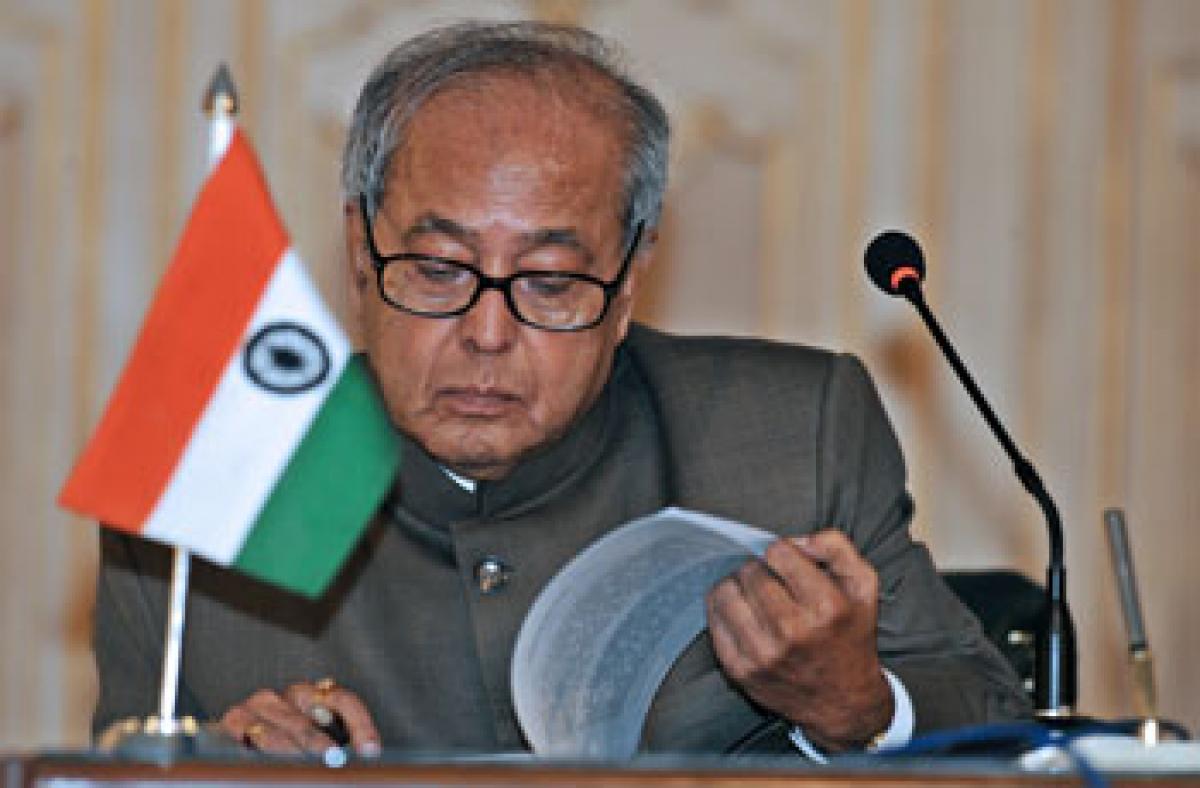Live
- ‘Game Changer’ team teases with a new promo
- Nara Lokesh emphasises overhaul of govt. schools and mid-day meal program
- Amid turmoil, air pollution peaks in Bangladesh as temperatures fall
- Google Trends unveils list of most searched ‘Indian Movies of 2024’
- BGT 2024-25: Hazlewood signals readiness for Brisbane Test after training with full run-up
- Google Presents Deep Research AI Tool for Comprehensive Web Reports
- Share of top 50 stocks to total market cap at all-time low: Report
- Nortje ruled out of SA’s remaining white-ball matches against Pakistan
- Mamata doesn't want INDIA bloc to succeed, claims BJP's Rahul Sinha
- Air India Express cancels flights at Chennai airport due to deluge
Just In

Indian academic institutions should adopt a more proactive approach to highlight their credentials on the world stage so that they do not lag behind in global rankings, President Pranab Mukherjee said while stressing that world-class education was feasible only with world-class faculty.
 Indian academic institutions should adopt a more proactive approach to highlight their credentials on the world stage so that they do not lag behind in global rankings
Indian academic institutions should adopt a more proactive approach to highlight their credentials on the world stage so that they do not lag behind in global rankings
Kalaburagi (Karnataka): Indian academic institutions should adopt a more proactive approach to highlight their credentials on the world stage so that they do not lag behind in global rankings, President Pranab Mukherjee said while stressing that world-class education was feasible only with world-class faculty.
A higher rank improves morale, enhances job prospects of students and helps attract both quality faculty and meritorious students, he said in his address at the second convocation of the Central University of Karnataka.
"It is a matter of great satisfaction that for the first time, two Indian institutions have figured amongst the top 200 universities this year. I hope other Indian institutions would follow suit," Mukherjee said. He said that the newer universities, through a sustained effort at better academic management, can soon be in the reckoning in global rankings.
Nations have since the times past overcome poverty, social ills and economic turmoil to push their productive frontiers on the foundation of a robust education system, he said. In ancient India, a thriving culture of knowledge generation and propagation existed, backed by such renowned seats of learning as Nalanda, Takshashila, Vikramashila, Valabhi and Odantapuri, which were a melting pot for scholastic pursuits of learners from far and wide, he said.
"The scenario is quite dissimilar now. Our institutions of higher learning lag behind many in the international rankings brought out by reputed agencies," the President said.
"For the last three years, on different occasions, I have urged Indian institutions to adopt a more proactive approach to present their credentials better," he said. Adding that world-class education was feasible only with world-class faculty, Mukherjee stressed that faculty development must be the top priority for institutions.
"In the context of teaching, we have to overcome the twin challenges of closing the vacancy gap expeditiously and also attracting meritorious people to this profession. A flexible approach to mitigate shortage of teachers is needed," he said. Adjunct faculty from industry and research institutions can be hired, he said, adding that they would provide an industry orientation in the higher education pedagogy. Specialists from abroad could inject new ideas, he said, adding that the Global Initiative for Academic Networks (GIAN) was a welcome step in this direction.
Noting that over 40 crore students are likely to seek education at different levels by 2016, Mukherjee said the education system has to gear up to meet the 'triple challenges' of accessibility, affordability and quality. "This task is compounded by the fact that 30 crore youth have been envisaged for skills training by 2022," he said.
Mukherjee said technology-led models could offer a viable solution in the education and skills delivery landscape and cited the Massive Open Online Courses (MOOCs) which have come up in a big way since it first started in 2008. Leading universities of the world have applied this technology model to provide quality education to larger number of education seekers.
Rich course content and flexible programmes, aided by innovative tools of evaluation and periodic classroom interaction in the form of modified MOOCs can work well for a country like India, where students are diverse in terms of educational attainments, socio-economic backgrounds and location, he said. He said mobile phone technology can also act as an enabler for formal and vocational education.
Skills training apart, education content from best institutions can be made available on mobiles. "E-platforms cannot substitute classroom teaching but it can perhaps play a complementary role. ICT tools like the National Knowledge Network have to be used extensively for collaboration of ideas, knowledge and academic resources," he said.
A developing country like India needs innovative solutions to issues in renewable energy, climate change, drinking water, sanitation and urbanisation, he said, asking universities to align their research priorities with these challenges. "Our universities have to be the breeding grounds for creative pursuits and cutting-edge technology. They have to inculcate in their students a scientific temper and a spirit of enquiry. Research promotion at the under-graduate level could facilitate this objective," he said.

© 2024 Hyderabad Media House Limited/The Hans India. All rights reserved. Powered by hocalwire.com







